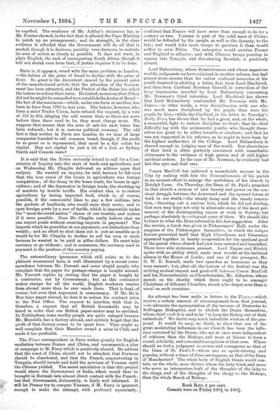An attempt has been made in letters to the Times,—which
receive a certain amount of encouragement from that journal, —to advocate the appropriation of the incomes of Deaneries to Suffragan Bishoprics, and to abolish the Deans themselves, whose chief work it is said to be " to keep the Bishop out of their cathedrals." We doubt very much indeed the wisdom of the pro- posal. It would be easy, we think, to show that one of the great moderating influences in our Church has been the influ- ence exercised by the Deans, who are at once more independent of criticism than the Bishops, and more at leisure to form a sound, scholarly, and conscientious opinion of their own. Where should we find a judgment so serene and courageous as that of the Dean of St. Paul's P—where one so spirit-stirring and popular, without a trace of time-serviugness, as that of the Dean of Manchester? The whole body of English Deans would con- tain, on the whole, more divines whom the laity trust, and more who serve as interpreters both of the thoughts of the laity to the clergy, and of the thoughts of the clergy to the Bishops, than the whole Bench of Bishops.














































 Previous page
Previous page